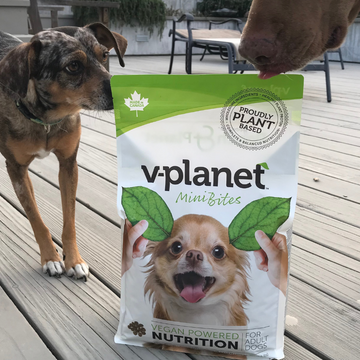Food Sensitivities and Allergies: How can a vegan diet help?
Food sensitivities and allergies in dogs have become increasingly common in recent years. Discomfort, digestive issues, and health problems can affect our pets. A vegan diet is a popular approach for managing food sensitivities and allergies. Examining food sensitivities/allergies in dogs, this blog will discuss the benefits of a vegan diet for symptom reduction and better health.

Understanding Food Sensitivities and Allergies in Dogs
Food sensitivities and allergies in dogs occur when their immune system reacts adversely to certain ingredients in their diet. Common allergens include beef, chicken, dairy products, eggs, and grains like wheat and corn. The symptoms can vary from mild to severe, including skin rashes, itching, gastrointestinal issues, and even anaphylaxis in extreme cases.

Identifying Food Sensitivities and Allergies
Recognizing food sensitivities or allergies in dogs can be challenging, as the symptoms may overlap with other health issues. However, common signs include chronic ear infections, excessive itching, vomiting, diarrhea, and persistent digestive problems. To properly diagnose these conditions and develop an appropriate treatment plan, consulting with a veterinarian is crucial.
Food Sensitivities & Allergies
Food allergies in dogs can manifest in various ways, and they are typically a result of the immune system's hypersensitivity to specific food ingredients. Here are some of the common types of food allergies seen in dogs:
- Protein Allergies: Proteins are often the primary culprits behind food allergies in dogs. Common protein sources that can trigger allergies include beef, chicken, lamb, fish, and dairy products. Dogs with protein allergies may experience symptoms such as itching, skin rashes, ear infections, gastrointestinal upset, and even respiratory issues.
- Grain Allergies: While grains are a staple ingredient in many dog foods, some dogs may develop allergies or sensitivities to grains like wheat, corn, soy, or rice. Grain allergies can lead to skin irritations, digestive problems, and ear infections.
- Dairy Allergies: Dairy products, such as milk, cheese, and yogurt, contain lactose, which can cause allergies or intolerances in dogs. Symptoms of dairy allergies may include vomiting, diarrhea, gas, and skin irritations.
- Egg Allergies: Eggs are a common allergen in dogs. Allergic reactions to eggs can result in skin problems, gastrointestinal distress, and in severe cases, anaphylaxis.
- Vegetable Allergies: While less common than protein or grain allergies, some dogs may develop sensitivities to specific vegetables, such as tomatoes, potatoes, or certain types of legumes. Symptoms may include digestive issues, skin irritations, and itching.
- Additive Allergies: Some dogs may be allergic to certain additives, preservatives, or artificial ingredients commonly found in commercial dog foods. These can include food colorings, flavor enhancers, or chemical preservatives. Allergic reactions to additives may present as gastrointestinal upset, skin problems, or respiratory issues.

The Vegan Diet as a Solution
A vegan diet, which excludes all animal-derived products, offers a potential solution for dogs with food sensitivities and allergies. By eliminating common allergens found in traditional dog foods, such as meat, dairy, and eggs, a vegan diet can help address the root cause of the allergic reaction. Plant-based alternatives can provide the necessary nutrients to support a dog's health and well-being.
Balancing Nutritional Needs
When considering a vegan diet for dogs, it's essential to ensure that their nutritional needs are adequately met. Dogs require a balanced diet that includes proteins, carbohydrates, fats, vitamins, and minerals. Plant-based protein sources like lentils, peas, and soy can replace animal proteins, while grains, sweet potatoes, and vegetables can provide carbohydrates and fiber. To meet essential nutrient requirements, it may be necessary to include supplements such as vitamin B12, taurine, and omega-3 fatty acids.
Transitioning to a Vegan Diet
Switching a dog to a vegan diet should be done gradually to allow for proper adjustment and to avoid digestive upset. It's recommended to consult with a veterinarian or a veterinary nutritionist who can provide guidance on the transition process and suggest appropriate vegan dog food brands that meet nutritional requirements. Regular monitoring and follow-up with the vet are crucial to ensure the dog's health is maintained.
Monitoring the Dog's Health
Once a dog has transitioned to a vegan diet, it's essential to monitor their overall health and well-being. Regular check-ups, including blood tests, can help assess nutrient levels and ensure the diet provides adequate nourishment. Signs of nutrient deficiencies, such as weakness, weight loss, or skin problems, should be addressed promptly to avoid any long-term complications.

Benefits of Vegan Food on Dog’s Health
- Elimination of Common Allergens: Many traditional dog foods contain common allergens such as beef, chicken, dairy, or wheat. Vegan dog foods eliminate these allergens, reducing the likelihood of triggering allergic reactions or sensitivities in dogs.
- Novel Protein Sources: Vegan dog foods often incorporate novel protein sources like legumes, quinoa, or soy. These alternative protein sources can be beneficial for dogs with known protein allergies or sensitivities, as they offer different amino acid profiles and may be less likely to trigger adverse reactions.
- Reduced Additives and Preservatives: Some commercial dog foods contain additives, artificial flavors, and preservatives that can exacerbate allergies in dogs. Vegan dog foods, particularly those made with natural and whole food ingredients, tend to have fewer additives, making them a potentially healthier option for dogs with allergies.
- Improved Digestion: Dogs with allergies often experience digestive issues like diarrhea, gas, or bloating. Vegan dog foods, especially those rich in fiber from plant-based sources, can promote better digestion and alleviate gastrointestinal discomfort in allergic dogs.
- Enhanced Nutritional Variety: Vegan dog foods often incorporate a wide range of fruits, vegetables, and plant-based ingredients, offering a diverse array of nutrients. This variety can support overall immune health and provide additional antioxidants and phytonutrient that may aid in managing allergies.
The vegan diet swoops in like a superhero, offering a colorful array of plant-based delights. With its power to soothe food sensitivities and allergies, it's time to embrace the flavors of veganism for our dogs. Let the adventure begin!

